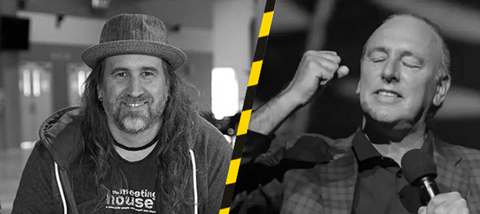From the resignations of Hillsong’s Brian Houston, Canadian pastor Bruxy Cavey and 24-7 Prayer’s Mike Andrea, to the very public spats over Vineyard Anaheim’s decision to leave the movement, it’s been a week full of very bad news for the Church. In acknowledging the pain of disappointment can be hard to bear, Sarah Yardley leads us into lament, and encourages us to look to Jesus to learn the lessons of good leadership

I found myself swearing last week, unloading all the pain and sharpness of disappointment at yet another dear friend and leader walking in sin with an outburst of profane language. My friend, not yet a follower of Jesus, turned and reminded me: “But words like that don’t belong in your mouth. Please, after all of this, be one who speaks words of hope.” God often gives me the gentlest and clearest reminders from my friends who are on the fringes.
I have watched many leaders fail over recent years - some dearly and personally loved, some only distant to my own experience – but each feels like a sucker punch. I compare it to swimming in an icy sea; you dive down deep under a wave, come up for a breath, and then the next set rolls in too quickly, pulling you under and threatening to drown you in its painful tow.
On weeks like these, I am reminded of the Psalms. The cries of these writers revealed something of the aching, longing and expectant hope that God would come and set to rights all that was broken. They screamed in anguish: “How long, O Lord? Will you forget me forever? How long will you hide your face from me?” (Psalm 13:1). When leaders fall - and fall with spectacular impact - our souls can feel betrayed.
I see some of the moral failures in our Church today and wonder about the unseen choices that turned hearts towards pleasure and power
If they have failed in this way, will God fail me as well? How was this hidden for so long? Who else was involved? Should I discard their books, their music, their teachings, their podcasts? What do I say to the teenagers in my life? The older, more jaded generation? Is it worth it to pursue truth when so many leaders end up in a recurring cycle of pain and failure? Are all the reports true? Does someone have a vendetta against Christian leaders? Why did no one listen? How long, O Lord?
Lament
Where our hearts are broken, scripture invites us to lament; to carry the full weight of our disappointment, anguish, pain and sorrow into the presence of Jesus. I have wept for the pain of watching many leaders fail, but Jesus has never failed me. That sentence has been hard-won, but I stand behind it with all my heart and soul. Jesus - the one who carried the cross; the one who knows suffering like no other; the one who was deserted by even his closest and dearest friends; the one who was blameless but accused - he has never failed.
Jesus continually invites us to choose his presence above any other platform
In recent months, it seems like we have seen an acceleration of sins exposed, hearts laid bare, the broken places in the lives of our leaders revealed. What do we do when we find our heroes have fallen from their pedestals? I have found the following areas essential as I navigate moral failure.
1. Look to Jesus
Beyond the current headlines, I think of key leaders in scriptural and Christian history: Noah, Moses, Naomi, David, Martin Luther, Karl Barth, Bill Hybels, Bob Coy, Ravi Zacharias, myself… At some point, all will fall and all will fail.
The only one in whom I have certain hope, trust and expectation of faithfulness is Jesus. When my leaders fail, I fix my eyes on him.
2. Seek truth and accountability
When I first experienced a period of watching leaders close to me fall into moral failure, I struggled with panic attacks, doubts, and anxiety. If they could fall, surely I would too. (I do, often). These questions can push us into pain and bitterness, or they can cause us to say: “But for the grace of God, there go I.” Choose friends in your life who will speak truthfully and honestly to places of failure, and ask for grace and help in growth.
3. Forgive
Forgiveness is a key distinctive of the Christian faith. It reminds us that the faults and failures that once defined us can be redeemed at the cross of Christ. Actively choosing to forgive can be challenging and raw, but it frees us from carrying a weight that will cripple us. As Ray Hinton, wrongly imprisoned for years for a crime he did not commit, wrote: “If you want to be free, you have to forgive, and I want to be free.”
4. Process the pain
Leaders fail. Allow that to bring grief. Let it break your heart, stretch your soul, make you weep. Don’t rush past the emotion that it can - and should - bring us when one who proclaimed the words of truth with life and power, who made doctrine dance, also allowed honesty to dance away as well. Read the Psalms. Lament. These are the wounds we received in the house of our friends, and our saviour is still binding them up.
5. Live in the light
I don’t publish every sin I wrestle with. I don’t feel the need to post every place I have battled pride, lust, gossip, fear or offence. But they are many. And my close friends, leaders and, above all, Jesus are walking with me in these places. If we walk in his light, we have fellowship with one another, and the blood of Jesus cleanses us from all sin (1 John 1:7). Wherever possible, live in the light.
6. Pursue presence above platform
Everything in our lives is an invitation to intimacy with Christ. Every day, we choose to turn our hearts towards his love or towards our own pleasures. I see some of the moral failures in our Church today and wonder about the infinitesimally small, unseen choices that turned hearts towards pleasure and power. It’s easy to sit in the position of judgment towards others and forget how much our own souls long for immediate pleasure. In the presence of Jesus, we find a different, deeper, eternal joy. He continually invites me to choose his presence above any other platform.
Learning what it means to be a leader who models the way of Jesus is a life-long process. A few of the characteristics I see in leaders of integrity include:
- We give away everything we possibly can. We are building kingdom, not empires.
- We’ve trained and sent. Some of those we’ve sent are far better than we are. Antioch sends her best.
- We see even the very raw giftings of others and name them wherever possible.
- We share our open doors, stages, platforms and opportunities.
- We are quick to know our own places of failure. We repent daily.
- We are bold and confident in Christ, the only hero of our stories.
- We sift the grit from the beauty in our history. We discard even the smallest roots of bitterness. We plant hope.
- We are expectant for the future.
- We seek and find the presence of Jesus, with us in all things.
- We know that all is grace.
I wonder, in the long, messy story of grace, how we will tell these stories in eternity. Will we look back and decide we needed better safeguarding, clearer boundaries or stronger accountability? Perhaps. But above all, I imagine we will look at all these places of heartbreak - the icy waves and profanity-inducing pain - and be reminded that even in these places, Jesus is present with us. Lament. Listen. Laugh. Learn. Even as we grieve the failure and pain, may we be reminded every day that all is grace.




































